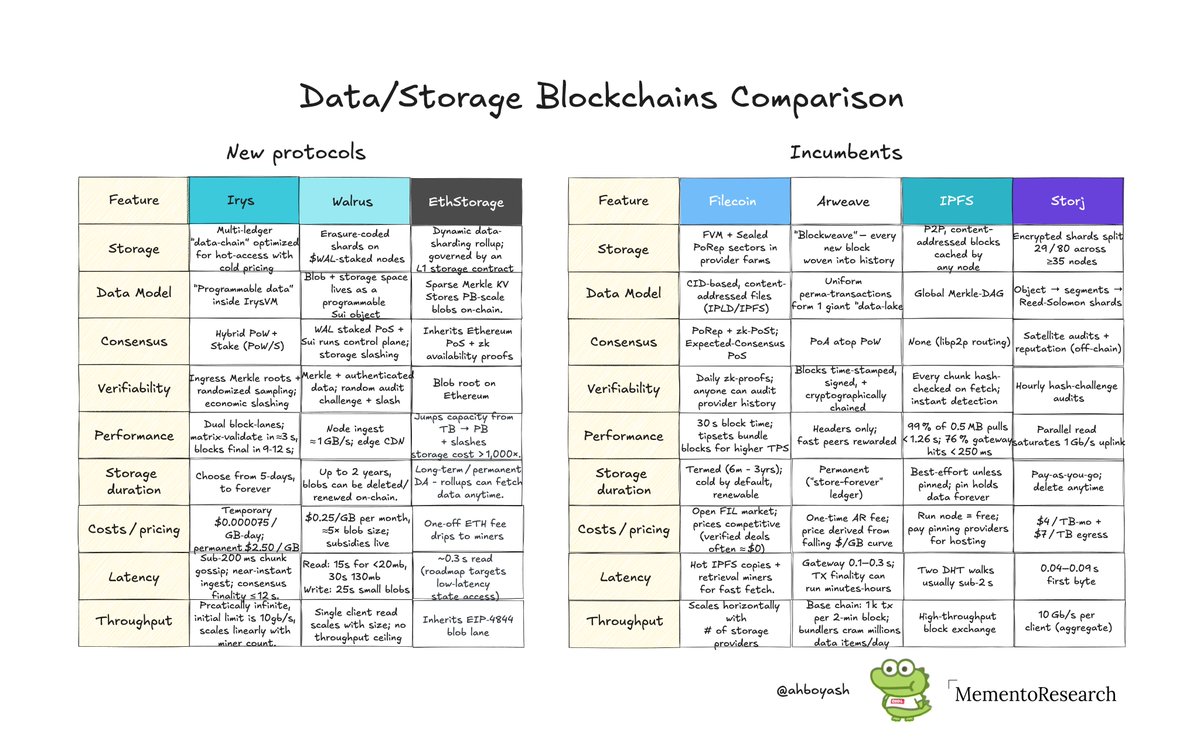Data/storage blockchains comparison
- - - - -
New protocols
a) @irys_xyz
• Programmable data-chain
• Hot Submit → Permanent Publish • uPoW + stake; daily byte sampling
• Hot-access speed at cold-storage price
• Throughput practically infinite but initial limit is 10gb/s
b) @WalrusProtocol
• Built on Sui Move (treats large “blob” objects as first‑class on‑chain assets) --> consensus and payments inherit Sui’s high‑TPS PoS
• Erasure‑coded replication – shards + parity stripes spread across WAL‑staked providers; automatic repair on fault.
• Programmable streaming –-> smart‑contracts can mutate and stream blobs, enabling on‑chain gaming assets and media NFTs
c) @EthStorage
• Blob‑based KV for Ethereum --> stores large key‑value chunks off‑chain but commits Merkle roots to L1
• EVM‑readable --> smart‑contracts can fetch stored values directly, enabling on‑chain dApps with gigabyte‑scale state.
• @eigenlayer security – providers stake ETH; zk‑ or fraud‑proofs slash dishonest nodes
- - - - -
Incumbents
a) @Filecoin
• Market‑driven cold storage --> clients negotiate pay‑per‑GiB deals with miners who lock FIL collateral and prove retention every 24 h via zk‑PoSt
• Dual role with IPFS – CIDs live on IPFS; Filecoin adds the economic layer for durable storage and a retrieval market for paid, low‑latency reads
• Proof‑of‑Replication security --> miners must physically seal unique data copies before they can earn block rewards or fees
• Programmability – the FVM (EVM‑compatible) lets dApps automate storage deals
- - - - -
b) @ArweaveEco
• “Pay‑once, store‑forever” --> one‑time AR fee
• Blockweave with Proof‑of‑Access –-> every new block must ref past data, forcing miners to store history and self‑audit integrity
• Permaweb layer –-> immutable web pages, smart‑contracts (SmartWeave) and AO compute run directly atop stored content
- - - - -
c) @IPFS
• Protocol, not a cloud – defines CIDs, a DHT and Bitswap; persistence comes only if someone “pins” the data.
• Content addressing --> data is fetched from any peer having the hash, eliminating link‑rot and boosting locality.
• Pluggable stack
• Gateway bridge – HTTP gateways let browsers fetch ipfs:// content without running a node.
d) @storj
• Decentralized S3 alternative –-> client encrypts & erasure‑codes objects into 80 shards stored on independent nodes
• Satellite audits --> reputation and micro‑payments are done by satellites that challenge nodes hourly for random pieces.
• Parallel retrieval –-> often out‑performing centralized clouds on throughput
- - - - -
Takeaways
• Economic layers differ: Filecoin & Storj pay per GiB-month; Arweave & Irys charge once; IPFS itself is free
• Proof diversity: zk-PoSt (Filecoin), PoA (Arweave), hourly audits (Storj), Merkle-receipt anchoring (Irys), slashed shard audits (Walrus), zk availability (EthStorage)
• Performance spectrum: Irys & Walrus focus on high-TPS ingest; Storj & Walrus leverage parallel reads; Arweave focuses on permanence over speed
Show original
21.94K
73
The content on this page is provided by third parties. Unless otherwise stated, OKX is not the author of the cited article(s) and does not claim any copyright in the materials. The content is provided for informational purposes only and does not represent the views of OKX. It is not intended to be an endorsement of any kind and should not be considered investment advice or a solicitation to buy or sell digital assets. To the extent generative AI is utilized to provide summaries or other information, such AI generated content may be inaccurate or inconsistent. Please read the linked article for more details and information. OKX is not responsible for content hosted on third party sites. Digital asset holdings, including stablecoins and NFTs, involve a high degree of risk and can fluctuate greatly. You should carefully consider whether trading or holding digital assets is suitable for you in light of your financial condition.

